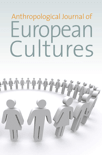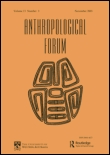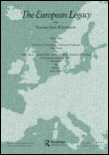
Anthropological Journal of European Cultures
Scope & Guideline
Illuminating the Diversity of European Cultural Narratives
Introduction
Aims and Scopes
- Cultural Heritage and Identity:
The journal explores the intersections of cultural heritage and identity, particularly how these elements shape and are shaped by societal dynamics across Europe. - Environmental Anthropology:
Research on the impact of environmental changes on cultural practices, particularly concerning intangible cultural heritage and community responses to climate change. - Colonial and Post-Colonial Studies:
A consistent focus on the legacies of colonialism and the ongoing implications for contemporary societies, including discussions on nationalism, identity, and cultural politics. - Methodological Innovations:
The journal highlights innovative anthropological methodologies, such as multi-sited ethnography and participatory approaches, that broaden the scope of anthropological inquiry. - Social Inequality and Marginalized Communities:
Attention to health inequalities, discrimination, and the lived experiences of marginalized communities, particularly in the context of crises such as the COVID-19 pandemic.
Trending and Emerging
- Climate Change and Intangible Heritage:
A significant increase in research addressing the impact of climate change on intangible cultural heritage, highlighting the need for sustainable practices and adaptability in cultural expressions. - Health and Wellbeing in Marginalized Communities:
Growing attention to health issues faced by marginalized groups, particularly during crises like the COVID-19 pandemic, emphasizing the role of anthropology in public health and social justice. - Decolonization and Representation:
A trend towards exploring decolonization processes within European contexts, examining how colonial legacies continue to influence contemporary cultural and political dynamics. - Digital Ethnography and Social Media:
An emerging focus on digital ethnography, particularly in relation to social media representations and their impact on cultural identities and community interactions. - Crisis and Resilience Studies:
Increasing exploration of how communities navigate crises, including economic, social, and environmental challenges, and the resilience strategies they employ to sustain cultural practices.
Declining or Waning
- Traditional Ethnographic Studies:
There has been a noticeable decline in conventional ethnographic studies that do not incorporate contemporary issues or innovative methodologies, suggesting a move towards more interdisciplinary approaches. - Historical Anthropology:
While historical contexts remain important, the focus on purely historical anthropological studies has decreased, possibly in favor of contemporary analyses that address current sociopolitical dynamics. - Focus on Material Culture:
Research explicitly centered on material culture without linking to broader social, political, or environmental issues has seen a decline, reflecting a shift towards understanding materiality in relation to identity and cultural practices.
Similar Journals

Studia Ethnologica Croatica
Bridging Tradition and Modernity in Ethnographic StudiesStudia Ethnologica Croatica is a distinguished open-access journal dedicated to the fields of ethnology and cultural anthropology, published by the University of Zagreb's Faculty of Humanities and Social Sciences. Since its inception in 1989, the journal has provided a platform for scholarly discourse and critical analysis of cultural practices, social structures, and ethnographic research pertinent to Croatia and beyond. With an impressive Q2 ranking in Cultural Studies and a strengthening presence in Anthropology (Q3), the journal is essential for researchers and practitioners alike, contributing significantly to ongoing discussions within these disciplines. Recognized on Scopus with notable rankings, it represents a valuable resource for those seeking to deepen their understanding of contemporary ethnological issues. The journal operates under an open access model, ensuring that its high-quality research is freely accessible to a global audience, thereby fostering collaboration and inspiring new inquiries within the social sciences.

Anthropological Forum
Connecting Scholars to Transformative IdeasAnthropological Forum, an esteemed journal in the field of anthropology, is published by Routledge Journals, Taylor & Francis Ltd. With an ISSN of 0066-4677 and an E-ISSN of 1469-2902, the journal has cemented its reputation for fostering critical discussions and innovative research since its inception in 1963. Covering a broad range of topics within anthropology, it has achieved an impressive Q1 ranking in the category of Anthropology and a Q2 ranking in Arts and Humanities (miscellaneous) in 2023, showcasing its pivotal role in advancing scholarly discourse. With a Scopus ranking placing it in the top 10% of its field, the journal provides valuable insights into contemporary anthropological issues, making it an essential resource for researchers, professionals, and students alike. Although not an open-access journal, the comprehensive studies and articles published within its pages contribute significantly to the academic and professional community. Addressed out of Milton Park, Abingdon, UK, the Anthropological Forum remains a seminal platform for disseminating high-quality anthropological research.

European Legacy-Toward New Paradigms
Exploring the Rich Tapestry of European HeritageEuropean Legacy-Toward New Paradigms is a distinguished academic journal published by Routledge Journals, Taylor & Francis Ltd, focusing on interdisciplinary approaches to cultural studies, history, and philosophy. With an ISSN of 1084-8770 and an E-ISSN of 1470-1316, this journal has made significant contributions to the understanding of European heritage and its impact on contemporary thought and society since its inception in 2001. It currently holds a Q3 ranking in Cultural Studies, History, and Philosophy, reflecting its relevance and scholarly impact within the academic community. Although not an Open Access journal, European Legacy provides valuable insights and research findings through its carefully curated articles, making it an essential resource for researchers, professionals, and students alike. The journal's commitment to exploring new paradigms fosters critical dialogue and encourages innovative perspectives on Europe’s complex legacies, thereby positioning itself as a vital platform for ongoing academic discourse.

Transylvanian Review
Illuminating Transylvania: Where History Meets Cultural StudiesTransylvanian Review is an esteemed academic journal published by the CENTER TRANSYLVANIAN STUDIES, focusing on the fields of cultural studies and history. Since its inception in 2008, this journal has been committed to exploring the historical and cultural dynamics of Transylvania and the broader region, contributing to the scholarly discourse on Eastern European studies. Although currently classified in the Q4 quartile of both cultural studies and history in 2023, it serves as a valuable resource for researchers, professionals, and students aiming to deepen their understanding of cultural intersections and historical narratives. With its commitment to interdisciplinary approaches and rigorous scholarship, Transylvanian Review plays an essential role in fostering dialogue and insight within the academic community, and it aims to continue expanding its influence through accessible and impactful articles. Based in Cluj-Napoca, Romania, it enriches the academic landscape with a unique focus on regional studies.

SLAVIC AND EAST EUROPEAN JOURNAL
Fostering Academic Excellence in East European StudiesThe Slavic and East European Journal (ISSN: 0037-6752) is a distinguished publication focused on the rich tapestry of Slavic and Eastern European cultures, languages, and literatures. Published by the Ohio State University’s Department of Slavic and East European Languages & Culture, this journal serves as a vital platform for scholars and researchers keen on exploring linguistic diversity and cultural heritage in these regions. With a wide-ranging scope, the journal addresses significant topics within Cultural Studies, Linguistics, and Literature, currently categorized in Q4 and Q3 quartiles across various academic metrics. Although it does not offer open access, anticipation is high among academics seeking to contribute or access cutting-edge research that pushes the boundaries of understanding these complex fields. As it converges from 2009 to 2024, the Slavic and East European Journal continues to uphold its commitment to academic excellence and community engagement, making it an essential resource for anyone dedicated to the study of Slavic and Eastern European traditions.

Chungara-Revista de Antropologia Chilena
Illuminating the Past and Present of Chilean SocietiesChungara-Revista de Antropologia Chilena is a premier academic journal dedicated to the field of anthropology, showcasing research and discourse that emphasize the rich cultural heritage of Chile and its surrounding regions. Published by UNIV TARAPACA, this journal serves as a vital platform for scholars, researchers, and students keen on exploring anthropological studies, ethnographic fieldwork, and cultural analysis. With an ISSN of 0717-7356, it adheres to rigorous academic standards and strives to promote open dialogue on contemporary and historical issues across various communities. Although currently not indexed in prominent metrics, its commitment to scholarly excellence contributes significantly to the academic landscape, fostering a deeper understanding of anthropological practices in Chile and beyond. Authors are encouraged to engage with the journal's rich repository of knowledge while readers gain access to pivotal insights that drive forward the discourse within anthropology.

South African Journal of Cultural History
Navigating the Complexities of Cultural History in South AfricaSouth African Journal of Cultural History is a leading forum dedicated to the exploration and analysis of cultural history within the diverse context of South Africa. Published by the SOUTH AFRICAN SOCIETY FOR CULTURAL HISTORY, this journal serves as an essential resource for researchers, professionals, and students interested in understanding the intricate past that shapes contemporary societies. With an emphasis on interdisciplinary studies, it encourages contributions that delve into various aspects of cultural heritage, identity, and social dynamics. While currently not an open-access publication, the journal aims to provide insightful articles that foster academic discourse and promote the preservation and appreciation of South Africa's rich cultural history. By engaging with this journal, scholars can connect with a vibrant community committed to advancing knowledge in cultural history and enhancing the visibility of South African cultural narratives on a global scale.

BULLETIN OF THE SCHOOL OF ORIENTAL AND AFRICAN STUDIES-UNIVERSITY OF LONDON
Advancing Knowledge in Cultural Studies and HistoryBULLETIN OF THE SCHOOL OF ORIENTAL AND AFRICAN STUDIES-UNIVERSITY OF LONDON, published by Cambridge University Press, stands as a pivotal journal in the fields of Cultural Studies and History, with an impressive track record dating back to its inception in 1917. With a current impact factor that places it in the Q2 quartile for both categories, this journal gives voice to a rich tapestry of research dedicated to the complexities of Eastern and African societies. Researchers exploring the nuances of cultural interactions, historical developments, and socio-political dynamics will find this publication invaluable, as it offers peer-reviewed articles that contribute significantly to the academia surrounding these diverse fields. Although the journal is not open access, it continues to attract a dedicated readership due to its rigorous scholarly standards and reputation for quality. The BULLETIN also boasts a noteworthy Scopus ranking, reflecting its influence and reach within the global academic community. Located in the United Kingdom, the journal serves as a hub for international scholarly exchange, encouraging contributions that delve into the rich heritage and contemporary issues of Oriental and African studies.

Nordeuropa Forum-Zeitschrift fur Kulturstudien
Advancing Interdisciplinary Dialogue in Cultural StudiesNordeuropa Forum-Zeitschrift fur Kulturstudien is a distinguished academic journal devoted to the interdisciplinary study of Northern European cultures, facilitating critical discourse and scholarly exchange since its inception by the Humboldt University of Berlin. With an ISSN of 1863-639X, it has embraced the principles of Open Access since 1998, ensuring that research findings are available to a global audience without barriers. Located in the heart of Berlin at Unter den Linden 6, 10099, it serves as a pivotal platform for researchers, professionals, and students interested in cultural studies, social dynamics, and historical developments in Northern Europe. While its HIndex and quartile rankings reflect its emerging influence, the journal aims to foster innovative scholarship and inclusive dialogue within the academic community. Through its commitment to advancing knowledge and accessibility in culture studies, Nordeuropa Forum remains an invaluable resource for those seeking to explore the rich tapestry of Northern European heritage and contemporary issues.

Revista Espanola de Antropologia Americana
Advancing Knowledge in Cultural StudiesRevista Española de Antropología Americana, published by UNIV COMPLUTENSE MADRID, SERVICIO PUBLICACIONES, stands as a significant contribution to the field of anthropology, particularly focusing on American societies and cultures. Since its inception in 1970, this journal has evolved, with issues currently being published until 2024, providing a platform for original research, reviews, and scholarly discourse. Despite being a Q3 category journal in the 2023 rankings, it plays a pivotal role in disseminating knowledge and stimulating academic debate within the anthropology community. With an ISSN of 0556-6533 and an E-ISSN of 1988-2718, Revista Española de Antropología Americana strives to engage researchers, professionals, and students with insightful content that reflects the dynamic nature of cultural studies. Although it operates under traditional access models, the rich array of topics covered ensures its relevance to ongoing scholarly conversation in social sciences and anthropology. Addressing a diverse array of anthropological themes, this journal is essential for anyone looking to deepen their understanding of the cultural frameworks shaping American societies.